Commentary on movies past and present by Steve Vertlieb An elderly man sits alone in a room, contemplating the years of his life. He is large of form. His belly hangs loosely over his belt. His hair has grown gray. He has known the enormity of success, and the emptiness of failure. He has known great wealth, and has had to beg for loans. He has experienced international success and fame, and succumbed to the torment of obscurity. He knew blinding respect and, later, endured the humiliation of ridicule. He savored the delicate passions of some of the world's most beautiful women and, for this particular moment, suffered unimaginable loneliness. Somewhere in the night, he expired. Frustrated, spent, he considered his life a grand exercise in futility. And yet, for a time, he had wielded power and fame like no one before him.
Some years earlier in another lonely hotel room, the legendary filmmaker had entertained his friend, Peter Bogdanovich. Welles sat in his great chair, seemingly transfixed by the image on the small television screen. A local station had been airing his version of The Magnificent Ambersons. The younger director noticed that Welles had been crying. "Orson," he asked, "What's the matter?" The older man, tears streaming down his cheeks, replied "It's over...it's all in the past." Bogdanovich stared quietly at his friend. There was nothing, after all, that he could say. George Orson Welles was born on May 6th, 1915, in Kenosha, Wisconsin. He weighed ten pounds at birth. His imposing size and larger-than-life demeanor precluded the company of friends. He wasn't particularly liked by the other children, and seemed to enjoy being a loner. His parents regarded their son with the same awe as the neighborhood children. Richard Welles and Beatrice Ives had married in November, 1903. Beatrice had been a concert pianist until hard times forced her into more mundane work. Richard pictured himself a struggling inventor, although he invented little. Both Richard and Beatrice realized early on that George Orson was a specially gifted child. As such, he was given free reign of his existence and rarely admonished or controlled. At times, it seemed that he had become the parent, while they obeyed and adhered to his every wish.
His gifts, he learned, were virtually without limit and he was nourished and nurtured as one might paint and develop a delicate portrait. The enormity of his talents and massive intellect were stimulated beyond imagining by this unfettered environment. The results of such pampering would both bless and curse him in later years when exposure to the elements of societal pressures would scar and diminish him. The slings and arrows of outrageous fortune would not suffer genius easily. When Dr. Maurice Bernstein moved his practice to Kenosha he was called to the Welles house to treat Beatrice's ailing mother, Lucy Ives. He quickly insinuated himself into the family persona and seemed, gradually, to take over the roles of husband and father. Richard was ineffectual in both roles, thereby incapable of halting the disintegration of his own familial identification. If there was a growing identity crisis within the Welles household, it was surely aggravated by the boy's insistence on referring to the intrusive physician as "Dadda." On May 6th, 1924, George Orson celebrated his ninth birthday in Chicago. The boy spent most of his day with his mother who was confined to bed with Hepatitis. She read poetry to him while he sat, dutifully, by her bedside. When it came time to blow out the candles on his cake, Beatrice asked him to make a wish. The boy blew out the candles, but never made a wish. Four days later, Beatrice passed quietly away. The boy never forgave himself, believing that it was his refusal to wish for his mother's return to health that had prevented her recovery. Richard faded further into the family background, while Dadda Bernstein became more firmly impregnated into the boy's perception as both mentor and parental intermediary. George had an older brother, Richard, ten years his senior, who was mentally unstable. While his brother spent much of his youth in psychiatric institutions, young Orson was mesmerized by the theatrical flights of fancy introduced into his life by his surrogate father.
After the trip, Bernstein moved his offices to Highland Park, both entertaining and treating respected artists, journalists and musicians. He would adoringly display his most prized "possession," the young prodigy whose company and affection he jealously coveted. Richard Welles continued to squander his funds. He purchased an ageing hotel, The Sheffield House, in Grand Detour and encouraged his pals to visit, eat, and drink, on the house. Orson would divide his time between Grand Detour and Highland Park. Under Bernstein's tutelage and scrutiny, Orson had become a precious acquisition to share with his important friends. Back in the comparative simplicity of Grand Detour, the boy seemed to recapture something of his childhood, a recollection of lost innocence. Young Charley Kane was able to traverse the snow covered streets of a simpler existence, astride Rosebud once more. According to Orson, he had once encountered Booth Tarkington at the Sheffield House. An acquaintance of his father, Tarkington authored his novel, The Magnificent Ambersons in 1918. Richard Welles deliberately resisted the advent of twentieth century technology until well into the 1920s, the boy recalled later, stating that electricity had not found its way into the Sheffield House until the advent of the Flapper era. Perhaps, it was this nostalgia for simpler times that influenced Orson's affinity for the Ambersons, and their hopelessly antiquated life style. In the Fall of 1925, Dr. Bernstein conspired with Richard Welles to find ten-year-old Orson some formal education. They sent him to Madison, Wisconsin, where he was interviewed and examined by Dr. Frederick Mueller. Mueller placed the lad in his boy's club, Camp Indianola, where Orson wrote, directed and starred in a hasty production of Dr. Jekyll and Mr. Hyde, performed for the other children serving time for the summer. Mueller, however, found the boy darkly beautiful, and made sexual advances toward him. Orson later wrote that this had become a recurring problem. "From my earliest childhood, I was the Lillie Langtry of the older homosexual set. Everybody wanted me." Whether these inclinations were provoked or invited by the youngster remains unclear. Yet, well into his adulthood and legendary association with producer, John Houseman, the celebrated dissolution of the their partnership seemed rooted in Houseman's sexual longing for the younger actor. Richard Welles decided then to send his son to the Todd School in Woodstock, Illinois, where Orson's brother had attended. Orson was happy at Todd, challenging his teachers with his superior intellect and honing his performance skills in enumerable school productions. It was during his stay at Todd that Orson's older brother, Richard, was certified as insane in 1927 and sent away to the Kankakee Institute for the next ten years of his life. Dick Welles, like his son after him, died alone in a hotel room on December 28th, 1930. While Orson was growing tall and strong, his father was deteriorating rapidly. Depression and chronic alcoholism eventually killed him and Orson, as he had done with his mother, blamed himself for not intervening in his father downward spiral. In the summer of 1931, armed with what portion of his inheritance Dada Bernstein would allow him, Orson left America to pursue a painting tour of Ireland. He fancied himself an artist and, at age sixteen, found his way to Dublin where he encountered actor Micheal MacLiammoir and his partner, Hilton Edwards, who managed the Gate Theatre together. Orson informed the pair that he was a distinguished thespian and, with typical bravado, persuaded them to hire him for their Irish repertory theatre. In his first professional work as an actor the teenager, forever identified with roles as older men, played the part of the Archduke in Lion Feuchtwanger's play, Jew Suss. Hopelessly amateurish, the boy still had a presence and a powerful, commanding voice. He performed in several plays for the duo but grew quickly bored and left Ireland for the bull fighting rings of Madrid, Spain. With his dark good looks and hypnotic voice, he had little trouble attracting sponsors, either male or female. He returned to America in 1933 at age eighteen where, at a party in Chicago, he was introduced to writer Thornton Wilder. Welles attempted to impress Wilder by telling him that he was, in fact, a writer, as well. Wilder, like many others, saw through the nonsense but was intrigued enough by the young man's confidence and flamboyance to offer him the lure of further connections...in this case, an introduction to celebrated New York theatre critic, Alexander Wolcott.
From November, 1933 until June, 1934 the company toured the United States performing three plays in repertory. Basil Rathbone was the star attraction as a forty-one year old Romeo in a production of Shakespeare's famous play, opposite Katharine Cornell as Juliet. Welles played Mercutio in the traveling performance, and the older actress found her young protégé a dynamic and theatrical presence. 1934...age 21 It was during the summer of 1934 that Orson Welles filmed his first motion picture, a four-minute, 16-millimeter silent titled Hearts of Age. Produced with his friend, William Vance, the experimental short featured Welles as the figure of Death, confronting a frightened, elderly lady played by Virginia Nicholson, a young Chicago socialite he would, perhaps, frivolously wed in November of that year. On December 21st, Romeo and Juliet opened on Broadway at the Martin Beck Theatre. However, in order to secure the talents of Brian Aherne for a production of The Barretts of Wimpole Street, Cornell was forced to offer the actor the part of Mercutio in the current Shakespearian production. Welles lost the part but was offered two roles in return, Tybalt and the Chorus. In the audience on opening night was a thirty two year old producer attempting to make his own mark in the New York theatre. Years later, John Houseman remembered being shattered by the performance of the young actor that night.
Houseman was putting together the cast of a play he was producing based upon a drama by Archibald MacLeish. Panic concerned a Wall Street financier named McGafferty whose world crumbles about him when consumed by the crash of 1929. Although the central figure is a man in his late fifties, Houseman became obsessed by the notion that only the man he’d seen on the stage that evening could play the part. He went back stage to meet Welles and invited him to join him after the performance at a local bar. Welles consented and, after preliminary conversations, agreed to leave the Cornell Company after a single night to take the lead in Houseman's play. MacLeish was similarly impressed with the raw power and vibrant enthusiasm of the boy and, despite protests by the stranded Cornell players, it was to be the beginning of a long theatrical association. Panic opened at the Imperial Theatre on March 15th, 1935. Among the cast members was Houseman's ex-wife, Zita Johann, who had co-starred with Boris Karloff three years earlier in Universal's The Mummy. The production, however, opened to indifferent notices and ran for a mere three performances. It was the genesis, though, for the forging of a great theatrical team in which Houseman would produce, and Welles would star in and direct a variety of productions for both the New York theatre and the radio airwaves. Their company would be called The Mercury Theatre. By the early days of 1934 Welles had already become a familiar player and vocal persona on live radio in New York. Actor Paul Stewart introduced Orson to Knowles Entrikin, the favored director of drama at the Columbia Broadcasting System. While auditioning for Entrikin, he encountered another young hopeful from Virginia by the name of Joseph Cotten. The two became fast friends, and worked together on a low-paying CBS educational series, designed for schools, called the School of the Air of the Americas. In addition to Cotten and Stewart, Welles began working with another struggling actor named Ray Collins. These actors would soon work together again. Meanwhile, Welles began gaining a reputation for his impossible stamina and childlike enthusiasm. He was rapidly becoming a fixture on the New York airwaves, finishing one live broadcast, then hopping a cab to the other side of town to act in another. Among the programs he appeared in at the time were Cavalcade of America and The March of Time, both for NBC. Who knows what evil lurks in the hearts of men?
Rarely had such fantastic scripting taken on such dramatic and epic proportion. His faithful female companion, Margot Lane, was played by Agnes Moorehead as, little-by-little, a growing stock company had begun to form. Welles starred as The Shadow for Mutual from 1937-1938, but he and his partner were already planning more explosive and provocative works. (After he left the series, it continued for another decade with other actors in the role of The Shadow and Margot, such as Bill Johnstone and Marjorie Anderson.) Negro Theatre Project In 1935, John Houseman had become actively involved with the Negro Theatre Project, a division of the Federal Theatre, promoted by the Works Progress Administration (WPA). While the productions featured large casts of black performers, the Negro Theatre was run by Houseman and Welles. Macbeth premiered at the Lafayette Theatre on April 14th, 1935, to enthusiastic reviews and remained sold out for each of its nightly performances. The play was regarded by critics and patrons as an enormous, if controversial success.
After its initial run, the play moved to the Adelphi Theatre. Welles had greater ambitions, both for himself and for his company, than the limitations of a strictly Negro ensemble would allow, and so the two ultimately severed their brief connection to the Harlem troupe and moved on to more diverse projects within the umbrella of the Federal Theatre. Among the many performers joining the newly formed repertory company were Joseph Cotten and George Coulouris. In the fall of 1936, composer Virgil Thompson introduced Welles to a more radical contemporary by the name of Marc Blitzstein, a socialist musician ten years Welles' senior. Blitzstein had been developing a radical musical about labor strikes and the prostitution of societal conscience. It was to be called The Cradle Will Rock. Blitzstein composed the score for the leftist production and Welles was determined to direct it for the Federal Theatre. America in 1937 was in a state of social unrest. There were strikes across the country at major steel plants and violent confrontations as workers actively sought union representation. The Federal Theatre production of Blitzstein's play was causing grave concern in the hallowed halls of conservative Washington, and rumors were running rampant that the production was inspired by Communist influence in America. The WPA announced that, due to increasing budgetary concerns, no new theatrical productions would either be sanctioned or paid for during the remaining months of the calendar year. That the edict was aimed at The Cradle Will Rock, in an attempt to cancel the production before it had an opportunity to open, was an open secret. Sets were confiscated, and salaries cancelled. Welles had pretended to sympathize with the composer's beliefs more than he actually did in order to produce what he had perceived would be a controversial play. Placed in the unlikely role of hero, he was determined now to see the production through, rather than bend to the histrionics of fear and unreasoning bigotry. Even without props, sets, or salaries he felt that honor and integrity must be served and that compromise was not an option. After a special preview on June 14th, the WPA sent armed guards to the theatre and had the facility padlocked.
In order to put on a show, Houseman and Welles were obliged to finance it themselves and rent another theatre. On the night of June 16th, 1937, at seven o'clock, theatergoers who had gathered at the entrance to the Maxine Elliott Theatre were asked to walk twenty-one blocks, in the smoldering heat of summer, to the Venice Theatre. The stage was bare, and the darkened theatre was ill equipped to accommodate either audience or cast...and yet, as Blitzstein played and sang at his solo piano, and actors and singers performed their roles in the aisles and amidst the audience, the fury and brilliance of raw theatre took hold of everyone in attendance, resulting in a legendary living theatre experience that no one who was there that night would ever forget. Updating the text to reflect modern concerns and betrayal, the setting was moved to Fascist boundaries in Europe where matters of idealism and conscience were agonized over upon an empty stage, populated by quasi-Nazi storm troopers and the threat of intellectual oppression. Welles and Houseman continued producing live experimental theatre for Mercury, while Welles continued to act on radio. In the summer of 1938, CBS was searching for a replacement for the popular Lux Radio Theatre. They approached Welles with the idea of doing a weekly series of dramas with his Mercury Theatre company. The Mercury Theatre of the Air was born. The program, First Person Singular, had scheduled an adaptation of "Treasure Island" as their first broadcast. Houseman had been working feverishly on the script. However, a week before the show was to air, Welles decided that a program far more dramatic was required. To Houseman's horror, "Treasure Island" was momentarily abandoned in favor of Bram Stoker's "Dracula". Welles would play the infamous vampire. During an all night session at Perkins' Restaurant, Welles and Houseman hashed out a script. The program aired to tremendous success, due to the dramatic urgency of Welles' sparse scripting and vocal intensity, as well as the eerily effective mood music written by a young composer/conductor he had encountered at CBS by the name of Bernard Herrmann. While Herrmann raged at the young director's arrogance, he soon came to respect and admire the artistic brilliance of his newly acquired friend and colleague. The War of the Worlds, October 30, 1938 For their Halloween production, Welles and Houseman decided to produce an adaptation of H.G. Wells' The War of the Worlds. The scripting assignment was handed to Howard Koch, a former attorney turned playwright. Houseman changed the locale of the Martian invasion to Grovers Mill, New Jersey and, for the sake of time and economy, suggested that the play be conceived as a series of breaking news bulletins. Koch was given a week to come up with a script. A transcription was recorded of the rehearsals. Both Welles and Houseman found it plodding, and requested a greater sense of urgency. Welles felt more comfortable with a realistic, documentary style approach. The play was scheduled to air the night before Halloween. Paul Stewart was busily directing the rehearsals, while Orson was appearing on Broadway. CBS gave its approval to the final script. They requested that several names be changed, including that of Franklin Delano Roosevelt. When the program aired, however, the vocal intonations of Roosevelt remained...even if he was referred to as a lesser positioned official. Legend has it that the actor hired to play the "high government official" was artistically limited to impressions of the president, so a Roosevelt by any other name was still a Roosevelt, yet more discreet. Welles arrived at CBS on Sunday, October 30th to direct, and star in the live broadcast. Announcements were delivered at the start, the middle, and at the conclusion to the effect that the audience was listening to a dramatization of H.G. Wells' War of the Worlds, performed by the Mercury Theatre. Enacted as a normal radio broadcast, the program was made deliberately innocuous with long stretches of band music, occasionally interrupted either by staged commercials or increasingly urgent news announcements disturbing the proceedings. The program began at eight o'clock in the evening in New York, concluding just one hour later. However, if one had missed the opening declaration or gone channel-surfing, so to speak, and tuned in late...there was nothing remaining in the context of the program, until the half hour point, to indicate that this was merely a dramatization. The somber tones of the announcer (Welles, himself) began his deliberate descent into calculated madness...
"We know now that in the early years of the twentieth century this world was being watched closely by intelligences greater than man's and yet as mortal as his own. We know now that as human beings busied themselves about their various concerns they were scrutinized and studied, perhaps almost as narrowly as a man with a microscope might scrutinize the transient creatures that swarm and multiply in a drop of water. With infinite complacence people went to and fro over the Earth about their little affairs, serene in the assurance of their dominion over this small spinning fragment of solar driftwood which by chance or design Man had inherited out of the dark mystery of Time and Space. Yet across an immense ethereal gulf, minds that are to our minds as ours are to the beasts in the jungle, intellects vast, cool and unsympathetic, regarded this Earth with envious eyes and slowly and surely drew their plans against us. In the thirty-eighth year of the twentieth century came the great disillusionment." If America had become willfully naive, consumed by home spun innocence of spirit, then the treasured security of a nation, with its isolationist head buried comfortably in the sand, was about to change forever. The life altering reality of the war in Europe and Hitler's own "envious eyes" would soon challenge our perception of dominion over this "small, spinning fragment of solar driftwood," and signal the terrible beginning of our own great disillusionment. For now, however, and for hundreds...perhaps thousands of bewildered radio listeners, the onslaught of an invasion from space was quickly becoming a horrifying reality. It all seemed so real. The mundane orchestral readings, punctuated increasingly by breathless news reports of destruction and slaughter by marauding Martian war machines laying waste to the Earth, was simply too horrifying to endure. It mattered little that CBS was, apparently, the only radio network privy to the startling news...for no other frequency carried the story with such fearful urgency. Yet, desolation of spirit and terror of heart seemed to consume and inspire a morbid, willing suspension of disbelief among countless Americans. Panic precluded the possibility of actually listening to, or comprehending the periodic network disclaimers. The CBS switchboard lit up like a demonic Christmas tree and, according to legend, filled the outer studios of the network with dozens of angry police officers and officials, while the program was still live on the air. Welles, Stewart, Ray Collins and the rest of the cast looked through the studio windows incredulously, while attempting to continue on with the dramatization. Outside the comforting confines of the sheltered radio facility, mobs of frightened citizens were taking up arms in order to defend themselves against the alien onslaught, while others calmly considered the preferable alternative of suicide. As the program concluded, anxious network executives pressured Welles and Houseman to prepare a statement, calculated to protect CBS from moral outrage, legal action and political condemnation. A bewildered Orson Welles confiscated the bloated radio microphone, delivering a hastily composed disclaimer to the listening audience...
"This is Orson Welles, ladies and gentlemen, out of character to assure you that The War of the Worlds has no further significance than as the holiday offering it was intended to be. The Mercury theatre's own radio version of dressing up in a sheet and jumping out of a bush and saying Boo. Starting now, we couldn’t soap all your windows and steal all your garden gates by tomorrow night...so we did the next best thing. We annihilated the world before your very ears, and utterly destroyed the Columbia Broadcasting System.
Orson Welles and his Mercury Theatre of the Air were planted firmly on the map of human events. Much has been spoken of that fateful broadcast over the years, and its impact on both American culture and the entertainment industry. Homage: The Night That Panicked America (1975) In October, 1975, the ABC Movie of the Week produced its own wonderful salute to the Panic Broadcast. The Night That Panicked America was a ninety minute telecast, a dramatic recreation of the famous evening. Paul Stewart served as Creative Consultant for the telefilm which featured, as its basis, a "story" by Nicholas Meyer. Directed by Joseph Sargent, the movie won critical and popular acclaim in its own right for its fascinating, meticulous account of the actual broadcast, and a marvelous, magical portrayal of Orson Welles by actor Paul Shenar. Welles had, indeed, created his own nearly mystical persona. He could write his own ticket now, and its destination was the only place on Earth large enough to accommodate his enormous talent and ego...Hollywood.
For his motion picture debut, Welles considered Joseph Conrad's dark tale of ambition and madness, Heart of Darkness, which later evolved into Francis Ford Coppola's 1979 epic, Apocalypse Now. He had played Kurtz in a radio adaptation of the novel. Boris Karloff had enacted the part on live television in the 1950s. A 200-page script was written. Some models were constructed, while the shooting of initial test footage had begun. The proposed budged for Heart of Darkness chilled George Schaefer's corporate blood, and he cabled Welles that, with a war going on in Europe, the project had become simply too extravagant. Welles was commuting weekly between Los Angeles and New York in order to fulfill his contractual radio obligations. Finally, the radio program relocated to the west coast, along with the Mercury players and production team. Little, if anything, had been done either to whittle down the budgetary difficulties of Heart of Darkness, or begin filming. When RKO threatened to eliminate the payment of salaries by December 31st if no progress had been made, Welles announced that he would pay his cast out of his own pocket. Houseman proclaimed that there wasn't enough money in their business account to pay anyone.
Welles had begun finding himself the uncomfortable object of derision and ridicule within the film industry. It was during this debacle that he encountered an alcoholic writer named Herman J. Mankiewicz. The writer had been experimenting with the germ of an idea...a screenplay concerning the rise and fall of a great man, as expressed and experienced by the people who had known him. He had considered the life of John Dillinger or controversial evangelist, Aimee Semple McPherson. He settled at last on publishing tycoon, William Randolph Hearst. Welles was brilliant, but erratic. Though, unquestionably, a creative genius, his ego rarely permitted acknowledgement of contributions by others. In later years, an embittered Mankiewicz would remember his collaborator with something less than affection, writing "There, but for the grace of God, goes God." Welles always gave "credit", however, to his co-author for inventing the catch phrase "Rosebud," which may have been something of an in-joke. According to author Gore Vidal, "Rosebud" was actually Hearst's affectionate name for Marion Davies' clitoris. He claimed that he retrieved that spicy information from screen writer, Charles Lederer (The Thing From Another World), who was Ms. Davies' nephew. In any case, Welles was irresistibly drawn to the story of a great tycoon, abandoned by his mother, and forced by circumstances to overcome a childhood cut irreparably short by circumstances. He had flirted with similar themes on his weekly radio program, and seemed obsessed with digging his own boyhood sled from out of the snows of memory. At this point in time, Welles did a curious thing for, like Charley Kane...first firing, and then sending a check to his former friend and colleague, Jed Leland...Welles telephoned John Houseman in New York, asking him to return to Hollywood in order to "baby sit" Mankiewicz while he completed the script, and keep him away from the booze. Still drawn to Welles, as was virtually everyone in his sphere, Houseman agreed. A seasoned editor and writer, himself, it may be argued that in assisting with the preparation of the script for Citizen Kane, he directed the story toward a more deeply complex duality...a Jekyll-and-Hyde conception of good and evil in which Charles Foster Kane represented the best and the worst personality traits of both Jekyll and his darker persona...or, Orson Welles and his imagined perception of William Randolph Hearst. Welles may unknowingly have been filming, at least in part, his own early autobiography. The earliest version of the complex and lengthy script was titled American. There is no denying that Hearst was a famous Newspaper Tycoon who had meddled in politics, seen his star rise and fall, had as his consort a motion picture actress who enjoyed playing with jigsaw puzzles, and built an extravagant fortress called San Simeon. And yet...the story of a precocious boy abandoned by his parents, conquering the world in sweet revenge for his early betrayal, might easily have been a metaphor for Welles' own frustrations, anger over his mother's death, and fantasies of becoming famous and rich in order to prove to the world that he was, indeed, special and important. Next -- Citizen Kane (continued)
|
Other unexplained photos on this site:
If you have a suggestion or a photo to submit, send it to:
Editor/viewzone.com
myristicin@hotmail.com
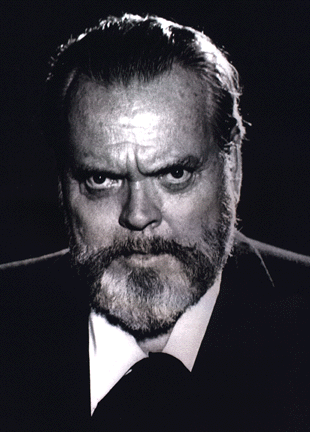 No, he wasn't Charles Foster Kane. Rather, he was the actor who portrayed him. At the end, in one of life's innumerable and cruel ironies, the controversial story of the greatest film ever made seemed to resemble less the life of the newspaper czar it was inspired by, than by the cocky, self assured wunderkind who filmed it. Long after the influence and memory of William Randolph Hearst had passed into history, Citizen Welles had drafted the tragic screenplay of his own demise.
No, he wasn't Charles Foster Kane. Rather, he was the actor who portrayed him. At the end, in one of life's innumerable and cruel ironies, the controversial story of the greatest film ever made seemed to resemble less the life of the newspaper czar it was inspired by, than by the cocky, self assured wunderkind who filmed it. Long after the influence and memory of William Randolph Hearst had passed into history, Citizen Welles had drafted the tragic screenplay of his own demise.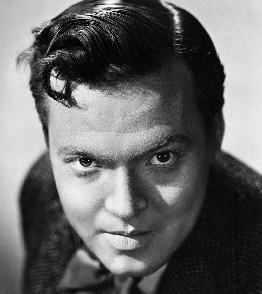 His dreams flourished with the passing years. As far as his parents were concerned, their son was a genius and could do no wrong. Whatever he desired was given freely and with devout encouragement. From his earliest years, the boy was told that he could do virtually anything...that he was a genius. The continuing idolatry by his parents gave the boy a feeling of weightlessness, of super human destiny.
His dreams flourished with the passing years. As far as his parents were concerned, their son was a genius and could do no wrong. Whatever he desired was given freely and with devout encouragement. From his earliest years, the boy was told that he could do virtually anything...that he was a genius. The continuing idolatry by his parents gave the boy a feeling of weightlessness, of super human destiny.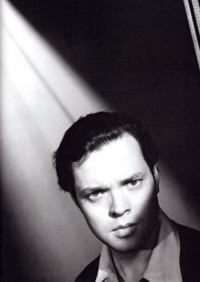 Dr. Bernstein purchased a puppet theatre for the boy and encouraged him to act out his fantasies while wearing colorful costumes. Upon the untimely death of his mother, Orson accompanied Dr. Bernstein on a summer European tour.
Dr. Bernstein purchased a puppet theatre for the boy and encouraged him to act out his fantasies while wearing colorful costumes. Upon the untimely death of his mother, Orson accompanied Dr. Bernstein on a summer European tour.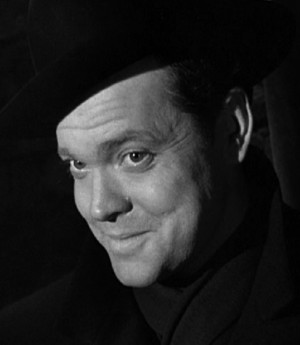 Wolcott took Welles to dinner and bought him a new, more presentable suit of clothes with which to wear when knocking on the doors of well placed producers and directors. One such director was Guthrie McClintic, the husband of legendary stage actress Katharine Cornell. Purely on the basis of his striking appearance and voice, and on the enthusiastic recommendation of Alex Wolcott, Welles was hired to play important supporting roles in the soon to be touring Cornell repertory company. A train ride from Chicago to Broadway had paid off handsomely.
Wolcott took Welles to dinner and bought him a new, more presentable suit of clothes with which to wear when knocking on the doors of well placed producers and directors. One such director was Guthrie McClintic, the husband of legendary stage actress Katharine Cornell. Purely on the basis of his striking appearance and voice, and on the enthusiastic recommendation of Alex Wolcott, Welles was hired to play important supporting roles in the soon to be touring Cornell repertory company. A train ride from Chicago to Broadway had paid off handsomely.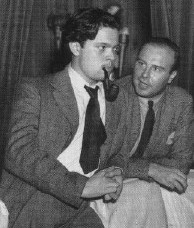 Orson Welles and John Houseman [right]. Houseman will regain fame later in life as Professor Kingsfield in The Paper Chase (1986)
Orson Welles and John Houseman [right]. Houseman will regain fame later in life as Professor Kingsfield in The Paper Chase (1986)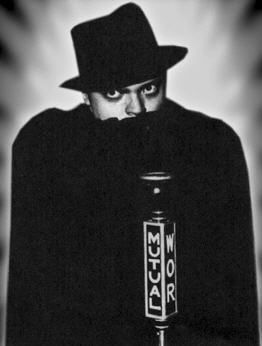 In the spring of 1937, Welles received a telephone call from the Mutual Broadcasting System asking him to take on the role of Lamont Cranston in the popular series, The Shadow. There he intoned the immortal lines: "Who knows what evil lurks in the hearts of men? The Shadow Knows."
In the spring of 1937, Welles received a telephone call from the Mutual Broadcasting System asking him to take on the role of Lamont Cranston in the popular series, The Shadow. There he intoned the immortal lines: "Who knows what evil lurks in the hearts of men? The Shadow Knows."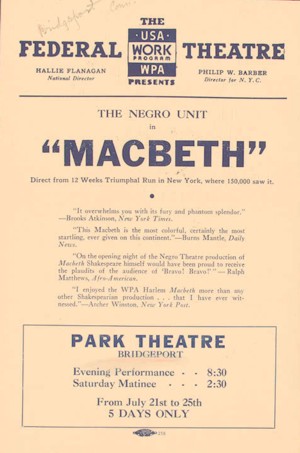 [right] Houseman produced, and Welles directed an all-black ensemble cast in a decidedly contemporary variation of Shakespeare's Macbeth.
[right] Houseman produced, and Welles directed an all-black ensemble cast in a decidedly contemporary variation of Shakespeare's Macbeth.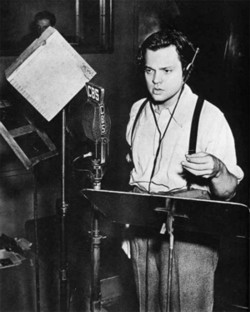 [right] On November 11th, 1937, the Mercury Theatre production of Shakespeare's Julius Caesar opened at the Comedy Theatre.
[right] On November 11th, 1937, the Mercury Theatre production of Shakespeare's Julius Caesar opened at the Comedy Theatre.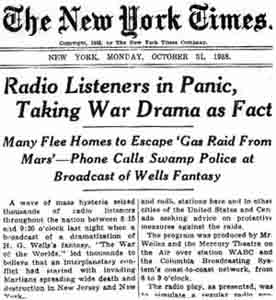 If Orson Welles' star had been on a steady rise since he first opened his eyes to the possibilities of fame and fortune he was now, arguably, the most famous man in America. Headlines screamed their inflammatory banners across the country..."Fake Radio "War" Stirs Terror Through U.S." (The New York Daily News)... "Radio Listeners in Panic, Taking War Drama as Fact" (The New York Times). If his intellectual apology was considered by some to be somewhat less than apologetic, it mattered little.
If Orson Welles' star had been on a steady rise since he first opened his eyes to the possibilities of fame and fortune he was now, arguably, the most famous man in America. Headlines screamed their inflammatory banners across the country..."Fake Radio "War" Stirs Terror Through U.S." (The New York Daily News)... "Radio Listeners in Panic, Taking War Drama as Fact" (The New York Times). If his intellectual apology was considered by some to be somewhat less than apologetic, it mattered little.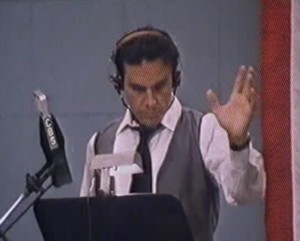 Welles began preliminary discussions with RKO's newly installed head of production, George Schaefer, in the spring of 1939. They had come to an agreement in July, with the actual contracts finally signed in August. Welles and his Mercury players had been given a generous two-picture deal, in which Welles would produce, direct, perform, and have full creative control of his projects.
Welles began preliminary discussions with RKO's newly installed head of production, George Schaefer, in the spring of 1939. They had come to an agreement in July, with the actual contracts finally signed in August. Welles and his Mercury players had been given a generous two-picture deal, in which Welles would produce, direct, perform, and have full creative control of his projects.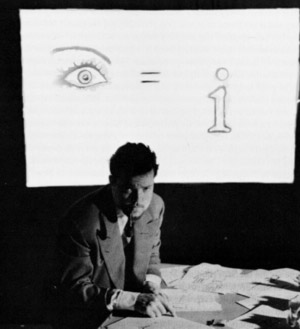 During a corporate dinner for the Mercury crew, Welles exploded, calling his partner a bloodsucker and a crook. As Houseman attempted to leave, Welles began hurling dish heaters at him, effectively ending both their partnership and friendship.
During a corporate dinner for the Mercury crew, Welles exploded, calling his partner a bloodsucker and a crook. As Houseman attempted to leave, Welles began hurling dish heaters at him, effectively ending both their partnership and friendship.